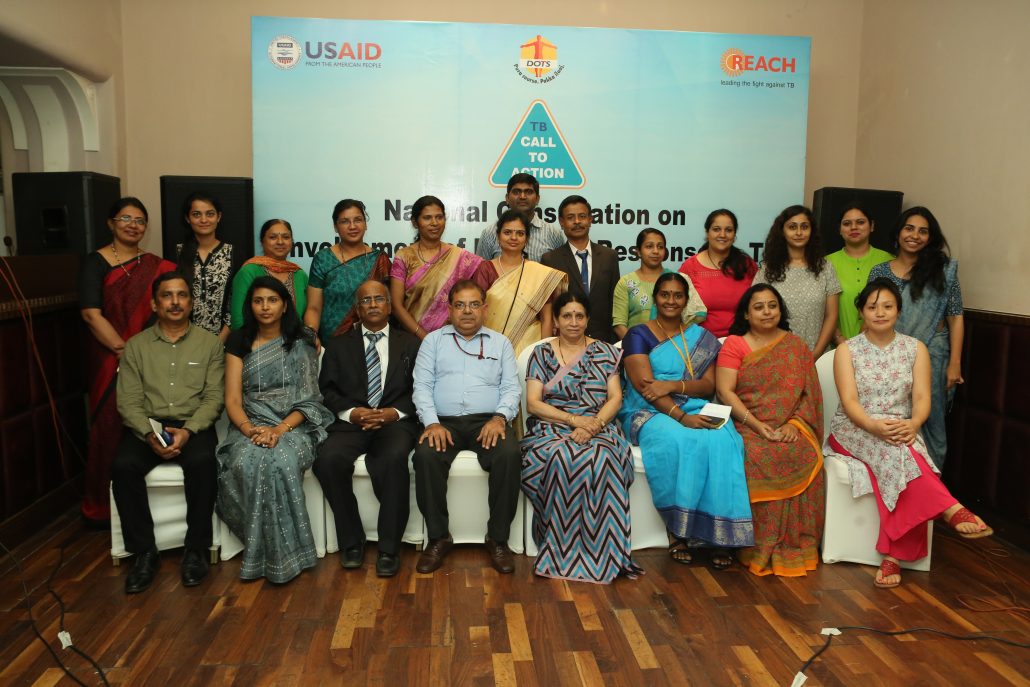
National Consultation on Role of Nurses in response to TB held
July 6, 2017, New Delhi: “TB is not just a biomedical problem, and we must develop the capacity of nurses across socio-economic and socio-medical factors for effective tuberculosis control,” said Dr Khaparde, Deputy Director General, TB, Central TB Division, Ministry of Health and Family Welfare, Government of India. He was speaking at a national consultation on the involvement of nurses in India’s response to TB, organized by REACH in New Delhi, in keeping with its mandate to involve previously unengaged stakeholders under the Tuberculosis Call to Action (TBC2A) project. The consultative meeting brought together experts from the nursing and medical professions along with development partners, to come up with a sustainable way to incorporate TB into the current nursing curriculum and training modules.
Nurses have the unique advantage of having earned the trust and respect of the public, having access to all levels of the population, working with patients over the course of their lifespan, utilizing a horizontal approach to healthcare, providing a range of services – from immunization to palliative care and everything in between – and finally providing individual and community-level interventions. In addition, nurses provide services at all levels of the service delivery system, from the PHC level to tertiary care hospitals.
“The National TB Programme has for long been working with medical colleges and NGOs, but not so much with nurses. A nurse is with the patient from womb to tomb – the first and often also the last point of contact for the patient as well as the patient’s family. We need to tap into this vast workforce, across stages of detection, diagnosis, treatment and adherence. Nurses, with their medical and paramedical background, can understand the complex TB treatment, that involves four, sometimes six types of drugs, including injectables. Nurses can also play the role of counsellor, for better treatment adherence and management of adverse drug reactions,” Dr Khaparde added.
Also speaking at the consultation, Mr T Dilip Kumar, President, Indian Nursing Council, said, “We need to keep nurses engaged all the way through, and here, periodic updation of their syllabus, curriculum and manuals goes a long way. Nurses, in addition to working for efficient treatment and adherence, also play a crucial role in early detection, if they are familiar with symptoms. In addition, they also come in contact with the close relatives or contacts of the patient, and can hence contribute significantly towards early detection of the TB disease.”
Participants discussed the many ways in which nurses could be involved in responding to TB, including a curative role in disease prevention and health promotion; providing health education at an individual and community level, and interdisciplinary work with other healthcare and public health professionals in order to provide the most comprehensive care possible. Nurses can contribute significantly by ensuring priority screening & diagnosis of presumptive TB cases, providing cross referrals of People living with HIV and patients seeking TB services to rule out HIV Infection, providing education regarding cough hygiene and adherence counseling, among other areas.
The meeting was organized by REACH in association with the Central TB Division, MoHFW and the United States Agency for International Development. Speaking at the meeting, Ms Smrity Kumar, Project Director, TB Call to Action, said, “Nurses are an important part of the health system, and all such stakeholders must come together to achieve the country’s target of eliminating TB by 2025. The objectives of this meeting were to assess the existing role of nurses and the way forward. Nurses need to be engaged in the implementation of the national TB programme from the highest to the lowest levels”.
Dr S N Misra, Consultant, REACH, who has vast experience in training of nurses in HIV, TB and ANM care, spoke about the impact of investing in such training. “India was the first-ever country selected by Global Fund for an exclusive training programme for nurses. While it started out for training on HIV, it was expanded to include TB and ANM training, thanks to the success seen in the HIV component. These trainings cover patient etiquette, bedside etiquette, infection control, communicating with family, confidentiality and other soft skills. Nurses felt empowered by these trainings and this ensured continuous engagement over their professional career,” he said.
The group discussed issues regarding sustainability of a training programme for nurses, as well as the engagement of nurses in private sector hospitals and the need for infection control mechanisms to protect the workforce. The meeting was also attended by representatives from the NITRD (expand), World Health Organization, JHPIEGO, Fortis Hospital, REACH and other key partners in India’s response to TB.
REACH is a non-profit organization dedicated to the fight against TB since 1999. The TB Call to Action project, supported by USAID and implemented by REACH in six states, seeks to amplify and support India’s response to TB by broadening the conversation around the disease and involving previously unengaged stakeholders.

